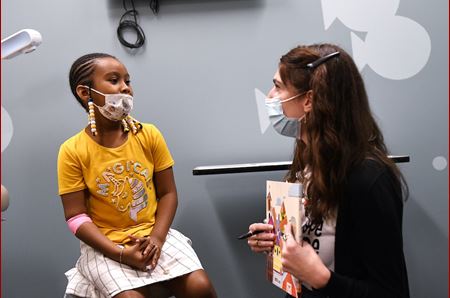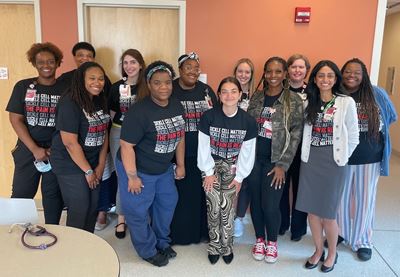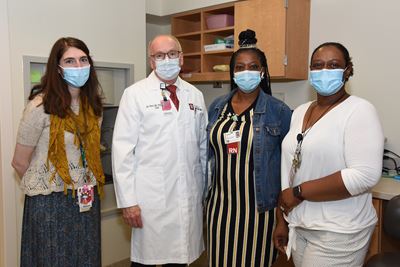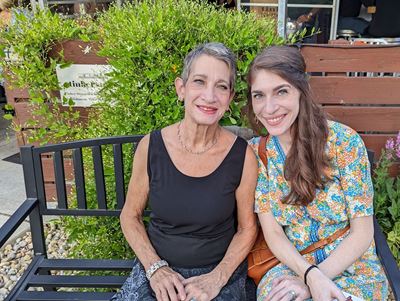“It’s a beautiful metaphor for the importance of community,” said LaMotte, a pediatric psychologist at Riley Hospital for Children at IU Health and an assistant professor of clinical pediatrics at Indiana University School of Medicine. “If one stitch gets dropped, to repair it, you have to tightly weave it to the ones around it. That is true for us as humans—we have to recognize our place within a bigger community and culture.”
LaMotte recently received the 2022 Outstanding Faculty Commitment to Diversity Award, given annually to a faculty member who advances diversity, equity, inclusion and justice (DEIJ) at IU School of Medicine. She is passionate about eliminating health disparities in historically marginalized patient populations, and she works tirelessly to crush systemic racism in academic medicine.
“She reminds us all that we must not only recognize and acknowledge medicine’s legacies of racism and inequality but also ensure that future health care providers are equipped to navigate these structural barriers on behalf of our patients and, ultimately, dismantle them,” said Pediatric Chief Resident Angela Amaniamong, DO.
Caring for kids with chronic diseases
At Riley Hospital, LaMotte works with children, adolescents and young adults living with chronic medical conditions including kidney disease and sickle cell disease. In March 2021, LaMotte launched the Sickle Cell Story Club, a literacy program that provides developmentally appropriate books featuring diverse protagonists to sickle cell patients ranging in age from infants to young adults.
 “In our clinic, about 95 percent of our patients identify as Black, African or African American, but only about 11 percent of children’s books feature Black characters,” LaMotte noted.
“In our clinic, about 95 percent of our patients identify as Black, African or African American, but only about 11 percent of children’s books feature Black characters,” LaMotte noted.
She makes book selections that are representative of the lived experiences of her patients and will even look for themes that match a specific child’s interests.
“Space is really big right now, so I’m on the lookout for books featuring Black characters in space,” she said.
By November 2022, over 1,000 books had been distributed to more than 340 patients.
“Not only are our patients—whether they are 1 or 16 years old—being encouraged to read, but they are learning positive messaging from characters that look like them, creating favorable experiences related to race and identity,” said Seethal Jacob, MD, MS, FAAP, director of the Comprehensive Pediatric Sickle Cell Program at Riley Hospital for Children and assistant professor of pediatrics at IU School of Medicine. “Patients with sickle cell disease have experienced the neglect of the healthcare system since before its discovery over 100 years ago as a result of systemic racism. Dr. LaMotte understood this, acknowledged it, and then sought to change the narrative.”
 LaMotte spends about half her clinical time with sickle cell patients and the other half with end-stage renal disease patients—kids who are on dialysis or have received a kidney transplant.
LaMotte spends about half her clinical time with sickle cell patients and the other half with end-stage renal disease patients—kids who are on dialysis or have received a kidney transplant.
“Having a chronic condition is tough on anyone. For kids, being on dialysis presents so many emotional, developmental and psychologic challenges,” said David Hains, MD, division chief of pediatric nephrology at IU School of Medicine.
LaMotte’s dedicated, comprehensive approach to improving the well-being of these young patients has been “transformative,” he added. “Julia is a caring, active listener who dreams big for our team and our patients.”
Championing cross-cultural empathy
To fund clinical programs like the Sickle Cell Story Club, LaMotte goes after grants from diverse sources. When her initial grant application didn’t materialize, she “took the disappointment and fueled it into persistence,” ultimately being rewarded with a grant from the Dollar General Literacy Foundation.
 LaMotte launched another initiative with medical resident Maya Cloyd, MD, MPH, called “Brave and Beautifully Black.” Supported by a grant from Riley for Women, the program provides hair and skin care products for Black patients who may find standard hospital products unsuitable.
LaMotte launched another initiative with medical resident Maya Cloyd, MD, MPH, called “Brave and Beautifully Black.” Supported by a grant from Riley for Women, the program provides hair and skin care products for Black patients who may find standard hospital products unsuitable.
“I had a teenage patient tell me about the damage caused to her hair because she had left her bonnet at home during a lengthy hospitalization,” LaMotte recalled. “For that girl, her hair mattered most to her. If we don’t have bonnets, then that’s a big miss on our end.”
LaMotte’s work around DEIJ extends beyond patient care. She does significant work with medical residents and fellows to help them develop cross-cultural empathy as care providers.
“Dr. LaMotte has taught me what it means to be a compassionate physician, and she inspires me to become a better advocate for my patients and colleagues,” said Amaniampong, who worked with LaMotte to develop anti-racist curriculum for residents in the Department of Pediatrics. “She has taught me that compassionate leadership truly involves trying to walk in the shoes of others, to better understand what our patients are experiencing at a much deeper level.”
The first cohort to go through the course reported it challenged their personal growth, increased their interest in health advocacy and heightened their awareness of how provider bias affects patient outcomes. This anti-racism training will continue, thanks to funding from the PRIME grant IU School of Medicine received from the U.S. Health Resources and Services Administration to provide doctors with tools to improve care for medically underserved and vulnerable communities.
“The ultimate goal is to abrogate unconscious bias, improve tactfulness and enhance decision-making that considers broader racial-socioeconomic perspectives,” said Gerard Hills, MD, a pediatric hematology-oncology and clinical informatics fellow with IU School of Medicine.
 LaMotte facilitates wellness sessions for fellows, including tips specific to minoritized individuals. She also has authored scholarly articles addressing bias in health care and ways to improve trust within the Black community.
LaMotte facilitates wellness sessions for fellows, including tips specific to minoritized individuals. She also has authored scholarly articles addressing bias in health care and ways to improve trust within the Black community.
“I cannot say enough about Dr. LaMotte and her extremely valuable commitment to diversity efforts and, honestly, her willingness to do the right thing by her patients, her colleagues and her learners,” Hills said.
To some, DEIJ training might feel like a “checkbox,” LaMotte acknowledges, but feedback from residents indicates they see it as meaningful work. Indiana’s newest physicians are eager to grow and lead systemic change.
“I leave every session thinking the future of medicine looks good because we are engaging these conversations and moving forward,” LaMotte said.
Leading transformative change
It may seem odd that a white woman from Massachusetts would develop such passion for DEIJ work.
“Part of who I am is absolutely because of who my parents are,” LaMotte said. “Our dinner table conversations were probably very different than other dinner tables. I know very little about sports but lots about politics. My parents challenged me to think about social responsibility and doing my part to make the world a more just place.”
 Her mother ran for town planning board to ensure income-restricted individuals and families would have equitable access to housing.
Her mother ran for town planning board to ensure income-restricted individuals and families would have equitable access to housing.
“She was this petite woman—the only woman on the planning board—and she taught me that, wow, you can be really powerful with your voice if you stay true to your mission and values,” LaMotte said.
While her parents were not in medical careers, LaMotte felt compelled to advance the fight for equity in the health care arena.
“I took one too many psychology classes in undergrad and realized that there was this intersection between mental health and physical health that I was just fascinated by,” said LaMotte, who graduated from Bridgewater State University and went on to earn a master’s degree and a PhD in clinical psychology from the University of Georgia.
She completed her residency at Dell Children’s Medical Center in Austin, Texas, followed by a fellowship at Children’s Hospital of Philadelphia. LaMotte joined IU School of Medicine as an assistant professor of clinical pediatrics in October 2020 and has quickly made an impact on both patient care and clinical education.
“I cannot imagine going back to a time where we did not have Julia’s sage advice, educational sessions and care models for our patients,” Hains said. “I am truly grateful that we have been so lucky to have her as part of our faculty. She has completely changed how we care for our patients.”
 LaMotte, who serves as co-chair of the Diversity, Equity and Inclusion Committee for the Department of Pediatrics, is leading difficult—and long overdue—conversations through a mindful, nonjudgmental approach, Jacob noted.
LaMotte, who serves as co-chair of the Diversity, Equity and Inclusion Committee for the Department of Pediatrics, is leading difficult—and long overdue—conversations through a mindful, nonjudgmental approach, Jacob noted.
“Dr. LaMotte is working to create change right where we are, making her impact on our team, our school and our community palpable,” Jacob said.
For LaMotte, one overarching goal continues to drive her passion.
“I would love for every patient who walks into our hospital system to feel that they are safe, both mentally and physically, and that their experiences are valid—that they are seen and valued for who they are,” she said.
